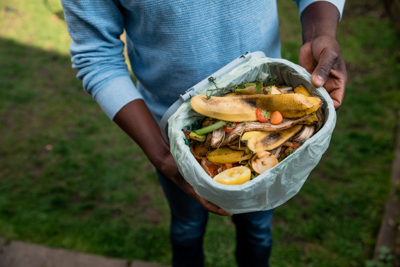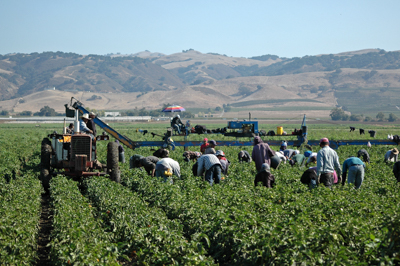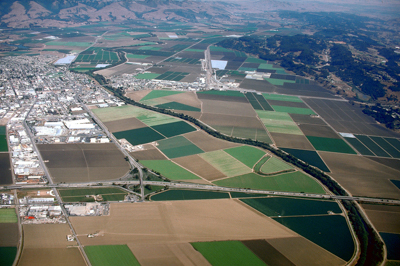Campus News
Five UC Santa Cruz projects win California Climate Action Grant funding
Millions of dollars in new funding will support UC Santa Cruz and partners in tackling some of California’s toughest climate change challenges through innovative research and community engagement.
Last week, in partnership with the state, the University of California awarded more than $80 million in California Climate Action Grants to four-year academic institutions across the state. These two-year grants are designed to spur implementation of solutions that advance climate resilience and social equity. Five UC Santa Cruz projects secured a total of more than $9.5 million in funding through the program, and three faculty members received additional subawards totalling more than $2 million.
The funding will support UC Santa Cruz and partners in tackling some of California’s toughest climate change challenges through innovative research and community engagement.
Maximizing benefits from the state’s composting program

A team of researchers led by Environmental Studies Professor and Gliessman Presidential Chair in Water Resources and Food Sustainability Elliott Campbell won a $1.99 million grant to study implementation strategies for California’s plan to reduce methane emissions by diverting 75% of organic waste from landfills by 2025.
The state’s rapid transition from landfill disposal to composting of organic waste will require building new infrastructure and planning carefully for what to do with the resulting compost. But the process could potentially offer a host of benefits in the agricultural lands where compost might be applied, including drought tolerance from increased soil moisture, enhanced carbon sequestration, and perhaps even reduced runoff of nutrient pollutants. Researchers will combine modeling techniques with new experimental data to offer decision support tools for how to maximize potential benefits while minimizing any social or environmental risks.
The team will run experiments to better understand the industrial composting process and the physical, biological, and chemical properties of the compost produced. They’ll also model the overall emissions footprint of landfill diversion under different scenarios to show how to optimize the net reduction in global warming potential. Researchers will map out where additional composting capacity might be needed and provide recommendations for where to put new facilities, incorporating insights on how market forces might affect demand for compost. And the team will model how compost can best be distributed geographically to maximize environmental benefits, including how much to apply for different soil types across the state.
“It’s a very special time to be doing this type of research,” Campbell said. “There are many investments being made in infrastructure over the next few years, so if ever there was a time to do this type of large-scale coordinated research on composting, it’s right now. What California is doing with this statewide mandate is pretty unprecedented, so this could become a model for other parts of the country and world.”
Supporting farmworker health and safety

Another $1.99 million grant will help to equip California farmworker communities with new tools to address the damaging impacts of climate change on their health and livelihoods. Politics Professor and Global & Community Health Program Executive Vice Director Matt Sparke will lead the project, with support from a broad contingent of 18 UC Santa Cruz faculty and partners at 10 community organizations and four other universities across the state.
The team will map out climate-related risk factors—like extreme heat, wildfire smoke, drinking-water pollution, flood damage, and crop failures—that disproportionately affect farmworkers and increase their vulnerability to ill-health, stress, and depression. A new bilingual app will share this information so that farmworkers, health workers, and farm supervisors can easily identify geographic “hotspots” of risk. The app and associated website will also include a health vulnerability checklist to help users identify key resources available or needed in their area to mitigate climate-related harms, and users can submit their responses to provide new data on these issues.
The project will additionally build partnerships among farmworkers, community health workers, growers, governments, and other stakeholders in the Pajaro, Salinas, and San Joaquin Valleys to develop solutions for the health and safety of farmworkers. Students from UC Santa Cruz and local high schools will support these efforts. Researchers will also study how new strategies and technologies that agricultural businesses might use to adapt to climate change could affect farmworkers, and the team will test some nature-based solutions with positive potential.
“Our approach is ultimately about adapting to the challenges that come with living in a climate-changed world, but this is not a passive adaptation or a vision of resilience that is about returning to the status quo,” Sparke said. “The goal is really to build back better—based upon the deep knowledge that farmworkers, growers, and government officials already have—in ways that enable people to be positive change agents.”
Connecting the housing crisis to climate impacts

Professor of Sociology Miriam Greenberg will lead a roughly $1.6 million grant project to conduct a first-of-its kind study of how California’s housing crisis affects the growth of the Wildland Urban Interface (WUI), where the fringes of development reach into natural areas. Development in the WUI now accounts for 50% of all new housing in the state, but the proximity to fire-prone landscapes and remoteness from emergency response services increases the risk from climate-related natural disasters. WUI development also impacts environmental health.
Researchers from the social sciences will conduct statistical and GIS analysis alongside interviews and surveys of WUI residents in order to identify areas where WUI development trends may primarily reflect lower income people being displaced from urban areas. Together with community partners—including Community Bridges, the Monterey Bay Central Labor Council, and the Santa Cruz County Office of Response, Recovery & Resilience—research teams will study what’s driving migration to the WUI, from affordability pressures to lifestyle choices; the demographics of this migration; and resulting dynamics, like growing commute sheds and vulnerability to hazards. The project will focus on California’s Central Coast, one of the most unaffordable housing markets in the U.S.
The team will also work with the Amah Mutsun Relearning Program and the Native Plant Program at the UCSC Arboretum & Botanic Garden and the Central Coast Prescribed Burn Association to study how the WUI impacts the effectiveness of prescribed burns for restoring culturally and ecologically significant habitat. They’ll use their findings to define different types of WUI impacts on fire and habitat and to demonstrate how some fire management and land stewardship strategies are best suited to certain WUI types. Researchers will also analyze the relationship between the WUI and puma behavior, demonstrating how different types of WUI development have varying habitat fragmentation impacts. Overall, results from the project will be shared through a “WUI Equity Atlas,” an interactive, online regional planning tool that will show connections between housing, climate, and conservation issues over space and time. The group will groundtruth the atlas through regional gatherings hosted by the Trust for Public Land.
“We see this as an opportunity to bring together a wide range of people who care about each of these issues,” Greenberg said. “Bringing those conversations together and showing people how these crises are related can help to center the critical need for affordable urban housing as part of the climate action and sustainability movement.”
Advising on new Pajaro River levee system

A team led by Hydrogeologist and Earth and Planetary Sciences Professor Andrew Fisher received a $1.99 million grant to determine how a state and federally-funded levee setback project along the Pajaro River could work with natural hydrologic processes to improve future maintenance and management of flood control areas and provide ecosystem, water quality, and water supply benefits.
The new research will support the Pajaro River Flood Risk Management Project, an initiative decades in the making that will begin work this year to modify, move, and reshape about 15 miles of levees, widening reaches for the Pajaro River and Corralitos and Salsipuedes Creeks in the process. This past March, a levee on the south bank of the Pajaro River breached, flooding the town of Pajaro and demonstrating the urgent need for levee improvements. UC Santa Cruz-led researchers—working with colleagues from UC Berkeley, UC Davis, CSU Monterey Bay, and the Resource Conservation District of Santa Cruz County—will assess conditions in the river channels and expanded river bank and wetland areas that will be contained within newly widened and rebuilt levees.
The research team will conduct measurements, sampling, analysis, and modeling to better understand factors like channel flow, sediment types and transport processes, aquifer recharge, and water quality within these parts of the river system, while also identifying opportunities to enhance wildlife habitat. The results will inform an operation and maintenance plan for the areas between the new levees in order to deliver as many different types of benefits as possible while optimizing flood control effects. The team will also explore how to streamline permitting processes for these types of multi-benefit projects in the future.
“Through this grant, we get to work with partners across the community and at state and federal levels to protect against impacts of larger and more frequent floods while also improving ecosystem resilience,” Fisher said. “Our work is just one part of a much larger project, but we hope to provide data and tools that engage and empower agencies, community groups, and stakeholders to pursue a wide range of benefits and adaptively manage the levee project as it moves forward.”
Engaging the public through art and science

migratory behavior of whales off California in response to
climate change. Photo: Friedlaender Lab
Rachel Nelson, director of the UCSC Institute of the Arts and Sciences, is teaming up with Ocean Science Professor Ari Friedlaender on a $2 million grant project to develop a research-based traveling art exhibition that will connect climate change impacts on whales and other marine animals with the precarity of vulnerable human communities.
The exhibition will be built around three major art and science collaborations featuring artists from some of the communities most impacted by climate change. Visual artists will explore the economic processes underlying both the disparate impacts of climate change on local farmworkers and the effects of agricultural runoff on migratory whales in the Monterey Bay. Sound artists and composers will develop an experience that helps people understand how melting Arctic sea ice changes whale behavior and impacts California’s coastal communities. And filmmakers and digital artists will share Indigenous experiences of migration that could shed new light on efforts to protect whales, as climate change threatens their migration patterns.
Each facet of the project will require new scientific research and close collaboration with partners, including Indigenous groups, community organizations, and nonprofits. The resulting exhibition will travel to university and public art museums across California. The project ultimately aims to improve understanding and problem solving around climate change in a way that addresses inequities in impacts.
“The urgency that we see in this work is that solutions to climate change are going to come from science and technology, but the public’s decision to embrace those solutions is going to require a social and cultural shift,” Nelson said. “And that’s something that the arts can help to accomplish.”
Collaborating on subawards
James Gilbert, an associate project scientist for the Institute of Marine Sciences at UC Santa Cruz, received a roughly $1.7 million subaward on a UC Berkeley-led project called COEQWAL (COllaboratory for EQuity in Water ALlocations) that will develop new water planning tools to advance sustainable, inclusive, and equitable water distribution for the state’s nearly 40 million people. As part of the project, Gilbert will lead a UC Santa Cruz team in developing water allocation models to explore alternative scenarios for managing water under a changing climate while coordinating analysis of results among collaborators across UC and CSU campuses. UC Santa Cruz researchers and NOAA collaborators will also analyze how water allocations under a changing climate affect endangered Central Valley salmon, as one of the project’s three use cases.
Emily Reigh, assistant professor of science education, received a subaward of more than $100,000 on a project led by UC Berkeley entitled “Preparing Teachers to Implement Justice-Centered Climate Change Pedagogy.” A collaboration between practicing teachers, teacher educators, scientists, and community advocacy groups, the project will develop a toolkit to support K-12 students in learning about climate change and taking action toward climate justice in their own communities. Reigh will study how up-and-coming science teachers learn to teach about climate justice.
And Professors of Electrical and Computer Engineering Keith Corzine and Leila Parsa received a more than $250,000 subaward on a UC Merced-led project titled “Improving Preparedness of Communities for Evacuations using Zero Emission Vehicles.” UCSC’s role will be to develop decision-aid tools that can guide community investments in charging, the power system, and transportation networks to allow zero-emissions vehicles to evacuate safely in the event of an emergency.